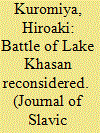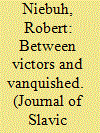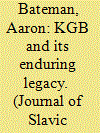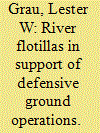|
|
|
Sort Order |
|
|
|
Items / Page
|
|
|
|
|
|
|
| Srl | Item |
| 1 |
ID:
148389


|
|
|
|
|
| Summary/Abstract |
Almost all history books claim that the Battle of Lake Khasan was provoked in the summer of 1938 by the aggression of Imperial Japan into Soviet territory. The Tokyo War Crimes Tribunal of 1946 accepted this version propagated by Moscow, which almost all historians have also accepted. There has been no substantive re-examination of this battle for more than three quarters of a century. Recent publications from Soviet military archives as well as documents from the Dmitrii Volkogonov Archive suggest that the Soviet-Japanese military conflict of 1938 was a cleverly disguised Soviet provocation. This fundamental reassessment of the battle has far-reaching implications for Moscow’s war of camouflage, disinformation, and obfuscation during the Soviet and post-Soviet era.
|
|
|
|
|
|
|
|
|
|
|
|
|
|
|
|
| 2 |
ID:
148391


|
|
|
|
|
| Summary/Abstract |
When Yugoslav strongman Josip Broz Tito secured power at the end of World War II, he used violence as a key mechanism in that quest. Owing to the contested nature of politics in Yugoslav territories, these acts of violence were diverse and focused on a number of different peoples, including prisoners of war. While scholarship has covered Tito’s use of viciousness at places such as Bleiburg, this article would like to suggest that violence was not ubiquitous. Documents at the Archive of Yugoslavia tell a story of how a small group of German prisoners of war fared under Tito’s regime, which I argue show that ideology trumped other aspects of early postwar politics. Various documents focus on Wehrmacht Battalion 999 and how this episode should inform our broader understanding of violence, ideology, and political control in the aftermath of World War II.
|
|
|
|
|
|
|
|
|
|
|
|
|
|
|
|
| 3 |
ID:
148385


|
|
|
|
|
| Summary/Abstract |
Russia’s interference in Ukraine and the crisis in its relations with Western countries have brought new challenges to its State Armament Program for the period 2011–2020. Post-Soviet Russia has remained dependent on Ukrainian components and subsystems for certain arms systems. New restrictions on access to Western dual-use technology and electronic components could hamper Russian technological development. The extent of the impact of Ukrainian and Western sanctions indicates that Russian adaptation to the new situation will probably take longer and come with a higher price tag than has so far been officially communicated. It is also plausible that Russia will have to enhance its defense industrial cooperation with China and India.
|
|
|
|
|
|
|
|
|
|
|
|
|
|
|
|
| 4 |
ID:
148386


|
|
|
|
|
| Summary/Abstract |
The creation of the Federal’naia Sluzhba Bezopasnosti in 1995 represented the eighth time that the Russian secret police underwent an organizational transformation since the contemporary service was created in the form of the Cheka in 1917. The post-Soviet Russian security services have been shaped by the early Soviet secret police’s identity as a domestic security service protecting the Bolshevik Party. After the USSR collapsed, the KGB did not die; its power increased to a level not seen since the Andropov era. The FSB is the most direct successor to the KGB’s domestic apparatus and functions as both an intelligence agency and the extrajudicial political police of the Russian Government. The FSB has become the dominant security institution in Russia, which is emblematic of the Russian state’s continuing and historical obsession with domestic security and the use of extrajudicial force to maintain political stability.
|
|
|
|
|
|
|
|
|
|
|
|
|
|
|
|
| 5 |
ID:
148388


|
|
|
|
|
| Summary/Abstract |
In the history of warfare, ground and naval forces frequently have to cooperate. There are usually problems putting these two forces together since their missions, equipment, training, communications and mutual unfamiliarity get in the way. These problems are common during transport of ground force equipment and personnel aboard naval vessels, exacerbated during amphibious landings and assaults and very difficult when operating together along major rivers. This article analyzes the Soviet history of defensive river flotilla combat during the first period of the Great Patriotic War (World War II against Germany). It outlines missions, the operational environment, lessons learned, the command and control problems experienced between naval and ground forces and the challenges of conducting such operations.
|
|
|
|
|
|
|
|
|
|
|
|
|
|
|
|
| 6 |
ID:
148390


|
|
|
|
|
| Summary/Abstract |
After the outbreak of the Cold War, the US Army had little knowledge of winter warfare and was behind the Red Army in this field. In an effort to learn from the experiences of others and strengthen the US military’s Arctic capability, a group of some 20 former Finnish Army officers were recruited into the US Army in 1947. This article examines this phenomenon as knowledge transfer, shedding light on the instructional role played by those Finns. Initially they taught winter fieldcraft, survival skills, and skiing. In order to better disseminate their know-how, the Finns were soon assigned to various military schools and units in which they revised field manuals, conducted classes, trained soldiers, wrote articles, participated in educational film production, tested and developed winter equipment, and planned and acted as umpires in winter exercises. The Finnish officers left their mark, and their legacy was best preserved in training literature and the lesson plans of military schools. They recommended a large winter training program for the US Army, but the Army leadership chose standard divisions employing standard tactics for potential cold weather operations against the Red Army.
|
|
|
|
|
|
|
|
|
|
|
|
|
|
|
|
| 7 |
ID:
148387


|
|
|
|
|
| Summary/Abstract |
The article shows, through an examination of recent public pronouncements, made by a number of prominent figures in Russia’s current military establishment, the continuing importance of an understanding of past Soviet military thought, particularly the work of G.S. Isserson. The article also advances the argument that if the West is to avoid being caught out by future Russian military action, it will have to ditch, once and for all, its decades-long assertion that Russia will not (cannot) represent a significant challenge to the West in any meaningful sense and, in its place, actively develop a deeper examination of Russian military and strategic policy.
|
|
|
|
|
|
|
|
|
|
|
|
|
|
|
|
|
|
|
|
|